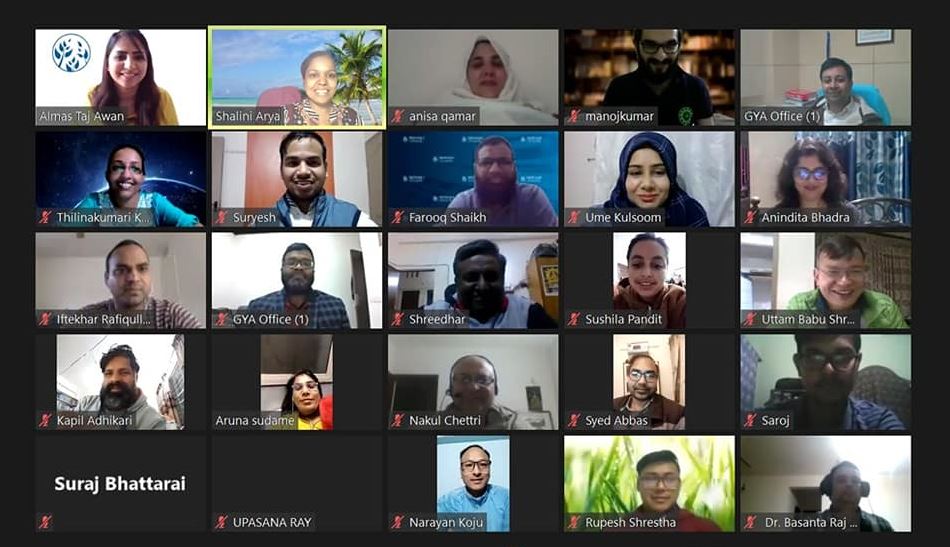The GYA Science Diplomacy in South Asia working group organised a five-day online workshop on Science Diplomacy in South Asia in November and December 2020. A total of 100 participants from seven countries (India, Bangladesh, Pakistan, Nepal, Sri Lanka, Maldives, and Bhutan) with diverse backgrounds were selected based on a competitive application procedure. 61% of selected participants were female, which can be seen as a very positive sign indicating women empowerment in this region of the world.
The purpose of this workshop was to create awareness in the South Asian population about Science Diplomacy and to share and teach the basic knowledge of Science Diplomacy to the selected participants.
At the end of each workshop day, the participants did a multiple choice test which covered the topics of that day’s session. After the final workshop session, the eleven highest-scoring participants were selected and declared the winners of the Science Diplomacy book “Science and Diplomacy: A New Dimension of International Relations (Science, Technology and Innovation Studies). The book’s author, Professor Pierre-Bruno Ruffini, also acted as speaker during the workshop.
Day 1: 21 November 2020
The Science Diplomacy in South Asia workshop started on 21 November 2020 with the opening remarks by the GYA Co-Chair Anindita Bhadra (India), and by chairpersons from National Young Academies in the region. The first invited lecture was delivered by Dr Bhaskar Balakrishnan on the “History of Science Diplomacy”. Then Diplomat Rômulo Neves gave a lecture on the “Art of Science Diplomacy”. This was followed by a lecture by Professor Pierre Bruno Ruffini who discussed the Science Diplomacy question “Are we all talking about the same thing?” Anindita Bhadra then closed the first workshop day with a brief introduction to the United Nations Sustainable Development Goals (UN SDGs).
Day 2: 28 November 2020
The following weekend, the second workshop day was started with a lecture on the topic “Science Diplomacy in Action: Strategies, Tools & Skills” by Dr Marga Gual Soler, which led to detailed discussion with participants. Then Dr Jauad El Kharraz delivered a lecture on “Lesson from Middle Eastern water diplomacy for South Asia”. This was followed by a lecture by Dr Chagun Basha on the “Role of Multilateral organisation in science Diplomacy”. Finally, GYA member and working group co-lead Monir Uddin Ahmed (Saudi Arabia) delivered a talk on the topic “Present scenario of scientific collaboration in South Asia” which was pertinent to the region.
Day 3: 5 December 2020
The third workshop day lecture session on the first weekend in December started with the lecture by Diplomat Pedro lvo Ferraz da Silva on the “Scope and importance of science and Innovation Diplomacy for developing economies”. After that, Dr Gihan Kamel extended the discussion on the topic “Regional peace and science diplomacy – middle-eastern experiences for South Asia”. Then, Muhammad Adeel delivered his lecture on “Careers for early career researchers in science Diplomacy and Science Policy”. This was followed by a breakout session in which participants were clustered into different small groups to discuss the UN SDGs, their importance and achievement through science diplomacy with particular reference to the south Asia region.
Day 4: 12 December 2020
The workshop day was started by GYA member Suraj Bhattarai (Nepal) with a lecture on “Science Diplomacy for Scientific Achievements in South Asia”. This was followed by a talk about the “Need of science diplomacy in South Asia” by GYA alumnus Aftab Ahmed (Pakistan). GYA alumnus Uttam Babu Shrestha (Australia) extended the session by a lecture on “Reinventing Science diplomacy in South Asia” and then GYA member Meghnath Dhimal (Nepal) discussed the “Recommendations for South Asia”. The last lecture of the workshop was delivered by GYA member Almas Taj Awan (Brazil) on “Communication as a tool for Science Diplomacy”. Finally, the workshop participants delivered presentations in small groups on their chosen UN SDG and role of science diplomacy to achieve the same in the region.
Day 5: 13 December 2020
The closing ceremony of the workshop took place with guests invited from the Asian region; and the winners from the multiple choice tests were announced. Four of the winners are women, and five are from India, four from Pakistan, one from Nepal, and one from Sri Lanka.
The workshop was concluded with a vote of thanks for the support, organisation and sponsorship by the Global Young Academy, speakers, participants and the organising team.
